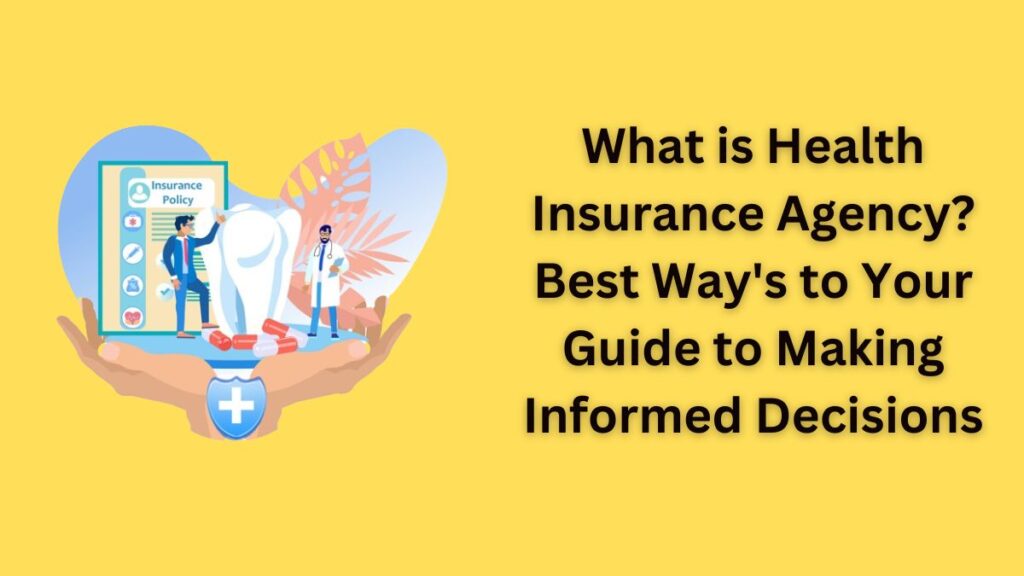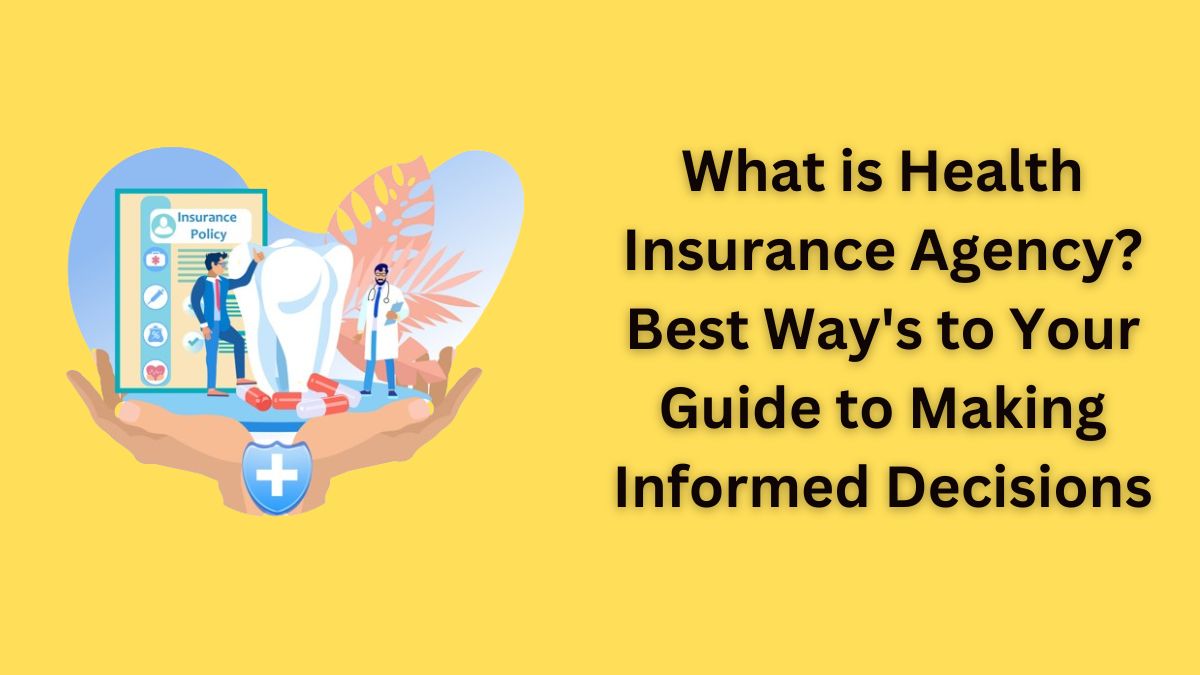Finding the right Health Insurance Agency can be a daunting task, given the myriad of options available in the market. Whether you’re an individual seeking coverage or a business owner looking to provide benefits to employees, understanding the nuances of health insurance agencies is crucial. This comprehensive guide aims to demystify the process, empowering you to make informed decisions about your healthcare coverage needs.

Navigating the Landscape
Navigating the complex world of health insurance agencies requires a solid understanding of what they offer and how they operate. They play a pivotal role in helping clients navigate the often-confusing terrain of health insurance policies. By leveraging their expertise, clients can make well-informed decisions that align with their healthcare needs and financial goals.
Understanding Health Insurance Agency
Health insurance agencies are entities that work with multiple insurance companies to offer a range of health insurance plans to consumers. They act as advisors, helping clients assess their coverage needs and find policies that align with their requirements and budget. By acting as a bridge between insurers and policyholders, health insurance agencies streamline the process of securing coverage and provide valuable guidance every step of the way.
What are Health Insurance Agencies?
The importance of health insurance agencies cannot be overstated. With the rising costs of healthcare and the complexity of insurance plans, having a knowledgeable ally by your side can make all the difference. Health insurance agents understand the nuances of different policies and can tailor recommendations to your specific needs, ensuring you get the coverage you need at a price you can afford.
Importance of Health Insurance Agencies
Individual health insurance plans provide coverage for a single person and are typically purchased by individuals who are self-employed or do not have access to employer-sponsored coverage. These plans offer flexibility and customization options, allowing individuals to tailor their coverage to their specific needs and budget.
Types of Health Insurance Plans
When exploring health insurance options, it’s essential to understand the different types of plans available.
Individual Health Insurance Plans
Individual health insurance plans provide coverage for a single person and are typically purchased by individuals who are self-employed or do not have access to employer-sponsored coverage.
Family Health Insurance Plans
Family health insurance plans extend coverage to multiple family members, offering a convenient and cost-effective way to ensure that everyone in the household is protected. These plans often include benefits such as preventive care, prescription drug coverage, and pediatric services, making them ideal for families with children or dependents.
Group health insurance plans are offered by employers to their employees, providing comprehensive coverage at group rates. These plans often include benefits such as preventive care, prescription drug coverage, and maternity care.
Choosing the Right Agency for Your Needs
Selecting the right health insurance agency is a critical step in securing the best possible coverage for yourself or your employees.
Before choosing an agency, take stock of your healthcare needs and budget. Consider factors such as your age, health status, anticipated medical expenses, and any pre-existing conditions.
Comparing Plans and Providers
Once you’ve determined your coverage needs, compare plans and providers offered by different agencies. Look for comprehensive coverage, competitive premiums, and a wide network of healthcare providers.
Finding the Best Health Insurance Agency
With countless health insurance agencies vying for your business, finding the best one can seem overwhelming. However, with the right approach, you can narrow down your options and find a reputable agency that meets your needs.
Researching Reputable Agencies
Start by researching reputable health insurance agencies in your area. Look for agencies with a proven track record of customer satisfaction, transparent pricing, and a wide selection of insurance products.
Reading Reviews and Testimonials
Reading reviews and testimonials from past clients can provide valuable insights into an agency’s reputation and service quality. Pay attention to feedback regarding claims processing, customer service, and overall satisfaction.
Benefits of Using Health Insurance Agencies
Partnering with a health insurance agency offers numerous benefits that can streamline the process of securing coverage and provide peace of mind.
Expert Guidance
Health insurance agents are experts in their field and can provide invaluable guidance throughout the insurance selection process. They can help you understand complex policy terms, compare options, and navigate the enrollment process with ease.
Time and Effort Savings
By leveraging the expertise of a health insurance agency, you can save time and effort that would otherwise be spent researching insurance options on your own. Agents handle the legwork, allowing you to focus on other priorities.
Common Mistakes to Avoid
When dealing with health insurance agencies, it’s essential to avoid common pitfalls that could potentially compromise your coverage or lead to unnecessary expenses.
Overlooking Coverage Details
One common mistake is overlooking the details of your coverage. Be sure to review your policy carefully, paying attention to exclusions, limitations, and coverage restrictions.
Ignoring Network Restrictions
Another mistake is ignoring network restrictions. Some insurance plans require you to seek care from in-network providers to receive full coverage. Failure to do so could result in higher out-of-pocket costs.
Not Reviewing Policy Renewal Terms
Lastly, failing to review your policy renewal terms can lead to unpleasant surprises down the road. Be proactive about reviewing your policy before it renews to ensure that it still meets your needs.
Understanding Policy Terms and Conditions
Understanding the terms and conditions of your health insurance policy is essential for making informed decisions about your coverage.
Premiums, Deductibles, and Co-pays
Premiums, deductibles, and co-pays are key components of any health insurance policy. Familiarize yourself with these terms to understand your financial responsibilities.
Coverage Limits and Exclusions
Be aware of any coverage limits and exclusions outlined in your policy. These limitations dictate what services are covered and under what circumstances.
Network Providers and Referral Requirements
If your policy has network restrictions, make sure you understand which healthcare providers are considered in-network and any referral requirements for specialist care.
Navigating Changes in Health Insurance
The landscape of health insurance is constantly evolving, with changes in healthcare legislation, policy terms, and coverage options.
Stay informed about updates in healthcare legislation that may impact your coverage options or eligibility for certain benefits. Consult with your health insurance agency or legal advisor for guidance.
Policy Changes and Renewals
Be proactive about reviewing your policy for any changes or updates, particularly at renewal time. Take the opportunity to reassess your coverage needs and make adjustments as necessary.
Adjusting Coverage to Life Changes
Life changes such as marriage, divorce, childbirth, or job loss can impact your healthcare needs and coverage requirements. Be prepared to adjust your coverage accordingly to ensure continued protection.
Must Read:-
- 10 Tips for Securing the Best Trucking Insurance | Best Way’s to Coverage in 2024
- What is Attorney Assistance? Best Way’s to Transform Your Legal Journey in 2024
Health Insurance Agency Related [FAQs]
Q1. How do health insurance agencies work?
Health insurance agencies act as intermediaries between insurance providers and individuals seeking coverage. They help clients assess their coverage needs, compare insurance options, and facilitate enrollment.
Q2. What factors should I consider when choosing an agency?
When choosing a health insurance agency, consider factors such as reputation, expertise, product offerings, customer service, and pricing.
Q3. How do I find the best health insurance agency?
To find the best health insurance agency, research reputable agencies in your area, read reviews and testimonials, and compare coverage options and pricing.
Q4. What are the advantages of using a health insurance agency?
Using a health insurance agency provides access to expert guidance, time savings, and a wide selection of insurance products to choose from.
Q5. What are some common mistakes to avoid when dealing with agencies?
Common mistakes to avoid when dealing with health insurance agencies include overlooking coverage details, ignoring network restrictions, and not reviewing policy renewal terms.
Q6. How can I understand the terms and conditions of my policy better?
To better understand the terms and conditions of your health insurance policy, review your policy documents carefully, ask questions, and seek clarification from your insurance agent or provider.
Conclusion
Navigating the world of health insurance agencies can be challenging, but with the right knowledge and guidance, you can make informed decisions about your coverage needs. By understanding the role of health insurance agencies, comparing plans and providers, and avoiding common mistakes, you can find the best coverage for yourself or your employees. Remember to stay informed about changes in healthcare legislation and policy terms, and be proactive about reviewing your coverage regularly to ensure continued protection.
